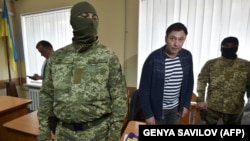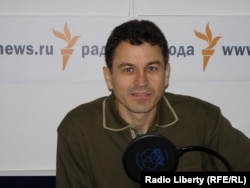During a May 19 joint press conference in Sochi, Russia, with German Chancellor Angela Merkel, President Vladimir Putin commented on the arrest of Russian journalist in Ukraine.
Ukrainian law enforcement arrested Kirill Vyshinsky, chief editor of RIA Novosti Ukraine, the Ukrainian branch of the Russian state news agency on May 15. He was charged with waging an information war against Ukraine and high treason.
Vyshinsky has dual Russian and Ukrainian citizenship. The SBU, Ukraine’s national security service, posted a photograph of the Russia, “For Service to the Fatherland” medal Vyshinsky received from Putin in 2014.
The Kremlin condemned Kyiv's actions and promised to protect the interests of Russian media.
Putin said the high treason charges brought against Vyshinsky are “unprecedented,” claiming he has “not seen anything like this in a long time.”
Both of Putin’s claims are false.
Journalists have faced high treason charges in many countries, and recent cases include Hilal Mammadov in Azerbaijan; three journalists in Somalia, where high treason is punishable by death; Carlos Julio Rojas in Venezuela; and Kamel Al-Tallou' in Libya.
And there was Russia’s own case – that of journalist Grigory Pasko.
Convicted of high treason for reporting about the Russian naval fleet's dumping of radioactive waste in the Sea of Japan, Pasko spent a total of 20 months in prison between 1997 and 1999 prior to conviction. He was sentenced to four years imprisonment in 2001, and then detained again on related charges. Pasko was released from prison in 2003.
Speaking of Putin, Pasko told Polygraph.info in a comment from Moscow: “We met on November 19, 1999 at the Russian PEN-Club, where he was asked about my case. And, in answering the question, he demonstrated a profound knowledge of all the details of charging me, a journalist, with high treason.”
Pasko added: “But Putin would not be Putin if he did not lie: the lie is exactly in his words about [it being] unprecedented. There was a precedent. And he apparently remembers it very well, because at the time, letters demanding my freedom were coming to him in piles.”
At the time, the president of Reporters without Borders, Robert Menard, told Radio Free Europe: “By punishing Grigory Pasko, Vladimir Putin and his government revealed to the world their true face. They can't forgive Grigory Pasko's encroachment on three forbidden subjects, three taboos. These are the army, atomic [power] and the environment. Journalist Grigory Pasko had enough courage to go after all three topics and this is the price he is paying for his courage.”






